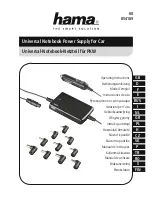
190
Glossary
surge protectors
— Prevent voltage spikes, such as those that may occur during an
electrical storm, from entering the computer through the electrical outlet. Surge
protectors do not protect against lightning strikes or against brownouts, which occur
when the voltage drops more than 20 percent below the normal AC-line voltage level.
Network connections cannot be protected by surge protectors. Always disconnect the
network cable from the network connector during electrical storms.
SVGA
— super-video graphics array — A video standard for video cards and
controllers. Typical SVGA resolutions are 800 x 600 and 1024 x 768.
The number of colors and resolution that a program displays depends on the
capabilities of the monitor, the video controller and its drivers, and the amount of
video memory installed in the computer.
S-video TV-out
— A connector used to attach a TV or digital audio device to the
computer.
SXGA
— super-extended graphics array — A video standard for video cards and
controllers that supports resolutions up to 1280 x 1024.
SXGA+
— super-extended graphics array plus — A video standard for video cards and
controllers that supports resolutions up to 1400 x 1050.
system board
— The main circuit board in your computer. Also known as the
motherboard
.
system setup
— A utility that serves as an interface between the computer hardware
and the operating system. System setup allows you to configure user-selectable options
in the BIOS, such as date and time or system password. Unless you understand what
effect the settings have on the computer, do not change the settings for this program.
T
TAPI
— telephony application programming interface — Enables Windows programs
to operate with a wide variety of telephony devices, including voice, data, fax, and
video.
text editor
— A program used to create and edit files that contain only text; for
example, Windows Notepad uses a text editor. Text editors do not usually provide
word wrap or formatting functionality (the option to underline, change fonts, and
so on).
TPM
— trusted platform module — A hardware-based security feature that when
combined with security software enhances network and computer security by enabling
features such as file and e-mail protection.
travel module
— A plastic device designed to fit inside the module bay of a portable
computer to reduce the weight of the computer.
book.book Page 190 Tuesday, October 7, 2008 6:00 PM
Summary of Contents for M1330 - XPS - Core 2 Duo 1.83 GHz
Page 1: ...w w w d e l l c o m s u p p o r t d e l l c o m Dell XPS M1330 Owner s Manual Model PP25L ...
Page 56: ...56 Using a Battery ...
Page 66: ...66 Using Multimedia ...
Page 70: ...70 Using ExpressCards ...
Page 82: ...82 Setting Up and Using Networks ...
Page 86: ...86 Securing Your Computer ...
Page 126: ...126 Troubleshooting ...
Page 154: ...154 Adding and Replacing Parts ...
Page 156: ...156 Dell QuickSet ...
Page 176: ...176 Appendix ...
Page 194: ...194 Glossary ...
Page 202: ...202 Index ...













































